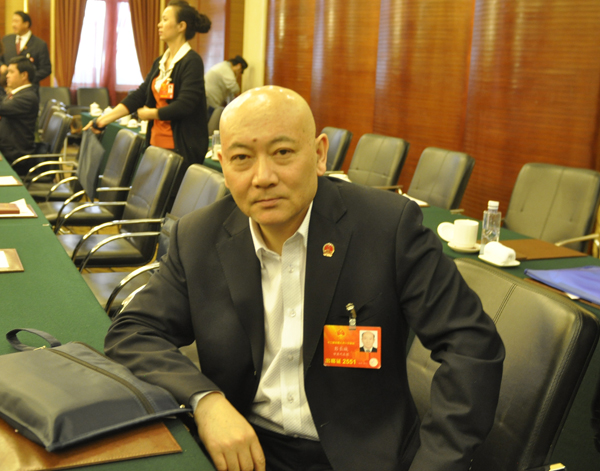Peng Changcheng: Let foreigners know more on China
- By Mi Xingang
 0 Comment(s)
0 Comment(s) Print
Print E-mail China.org.cn, March 14, 2013
E-mail China.org.cn, March 14, 2013
The Chinese Culture Going Global project is in fact a long process that requires perseverance and the appropriate attitude, said Peng Changcheng, a deputy to the National People’s Congress (NPC) and editorial board director of influential magazine Reader, during an exclusive interview with China.org.cn after a meeting of the Gansu delegation to the first session of the 12th NPC on March 11, 2013. Dubbed as the chicken soup for the Chinese soul, Reader goes back over thirty years and is especially popular among teenagers.
|
|
|
Peng Changcheng, a NPC deputy and editorial board director of influential magazine Reader, takes an exclusive interview with China.org.cn after discussion meeting of the Gansu delegation to the first session of the 12th NPC on March 11, 2013. [Photo: China.org.cn / Mi Xingang] |
Comparatively speaking, Chinese people know more about foreign history than foreigners know about that of China, Peng has learned from his personal experience. He recalled the scene when they went abroad to talk with a French publisher years ago. "They were extremely impressed that we were so familiar with the Louvre, Dumas and French Revolution, whereas what they said about China still stood on episodes of decades ago," Peng stated with regret.
"If you have an apple and I have an apple and we exchange these apples, then you and I will still each have one apple. But if you have an idea and I have an idea and we exchange these ideas, then each of us will have two ideas," Peng quoted George Bernard Shaw's classic words to illustrate the significance of cultural exchange between China and western countries. Communication should focus on the essential and valuable ideas from both sides, he emphasized.
Over the course of the Chinese Culture Going Global project, the overseas Chinese and foreigners living in China could serve as envoys to spread Chinese knowledge, he said. With regards to introducing Chinese civilization in foreign languages, realms of research should be conducted on the needs of foreign readers, their ethnic values and reading habits as to produce works which will cater to their taste, he explained.
Peng hailed the success of establishing Confucius Institutes for the promotion of Chinese culture around the world. He also put forward that China's food culture could serve as a window for foreigners to learn more about China. To his delight, having Chinese food has already become a fashionable thing to do in many countries, he said. "Through cuisine culture, we can gradually convey tremendous Chinese cultural resources to foreigners and it will certainly accelerate the going global process," he confidently said.
To conclude the interview, Peng pointed out: "Without a strong economy and national strength being background, the culture going global is just empty talk."






